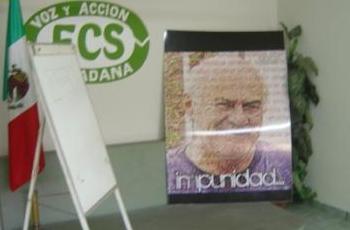The US is employing a new tactic in Afghanistan: Killing or capturing drug traffickers linked to the Taliban (though not those linked to the Karzai government). Is that even legal under international law? The US military says it is, but not everyone agrees.
The Chronicle reviews a journalistic treatment of the Mara Salvatrucha gang and an anthropological treatment of a group of homeless middle-aged heroin addicts. We found one much more satisfying than the other.
As part of our summer fundraising drive, DRCNet is pleased to offer Ryan Grim's exciting new book, "This Is Your Country on Drugs: The Secret History of Getting High in America," as our latest membership premium. Things are happening, and the importance of your support at this time could not be greater.
Every two years drug policy reformers from across the United States and around the world come to the International Drug Policy Reform Conference to listen, learn, network and strategize together for change. This year the conference is in Albuquerque, in November, and StoptheDrugWar.org is a partner.
It's been another bloody couple of weeks of prohibition-related violence in Mexico. Here's the latest on that and other drug war developments south of the border.
The Chronicle may have taken a week off, but corrupted law enforcers didn't take time off from their illicit enterprises, and there was no letup in corrupt cops stories. Here's this week's motley crew.
Does taking a hit off a joint merit a death sentence? A Hawaii insurance carrier thinks so, and it's not alone.
Oregon has become the latest state to pass legislation enabling the farming of industrial hemp and, like North Dakota, they don't need no stinking federal licenses. But the DEA tends to disagree about that.
This press release from the group Vote Hemp describes an absurd situation in which confused Capitol Hill police seized legal hemp fibers that a lobbyist had planned to use to help alleviate such confusion.
North Carolina is about to join the ranks of states and localities that have banned salvia divinorum. A bill has passed the legislature and awaits the governor's signature.
Talk of marijuana legalization is definitely in the air in California, but none of the announced major party gubernatorial candidates want to add to it. Yet.
We knew Dubai was tough on drugs; we've seen the horror stories about unwary travelers busted for microscopic amounts of dope and routinely sent off to prison for four years. But this is ridiculous.
Events and quotes of note from this week's drug policy events of years past.
Do you read Drug War Chronicle? If so, we need your feedback to evaluate our work and make the case for Drug War Chronicle to funders. We need donations too.
Apply for an internship at DRCNet and you could spend a semester fighting the good fight!
"What Will the Cartels Do After Drugs Are Legal?," "The Drug Cartels Have Their Own (Stolen) Oil Company," "Drug Traffickers Plot to Kill Mexico's President," "Police Will Do Anything to Arrest People for Marijuana, Part II," more...

hidden drug cache, Afghanistan 2008 (from nato.int)
A congressional study released Tuesday reveals that US military forces occupying Afghanistan have placed 50 drug traffickers on a "capture or kill" list. The list of those targeted for arrest or assassination had previously been reserved for leaders of the insurgency aimed at driving Western forces from Afghanistan and restoring Taliban rule. The addition of drug traffickers to the hit list means the US military will now be capturing or killing criminal -- not political or military -- foes without benefit of warrant or trial.
The policy was announced earlier this year, when the US persuaded reluctant NATO allies to come on board as it began shifting its Afghan drug policy from eradication of peasant poppy fields to trying to interdict opium and heroin in transit out from the country. But it is receiving renewed attention as the fight heats up this summer, and the release of the report from the Senate Foreign Relations Committee has brought the policy under the spotlight.
The report, Afghanistan's Narco War: Breaking the Link between Drug Traffickers and Insurgents, includes the following highlights:
- Senior military and civilian officials now believe the Taliban cannot be defeated and good government in Afghanistan cannot be established without cutting off the money generated by Afghanistan's opium industry, which supplies more than 90 percent of the world's heroin and generates an estimated $3 billion a year in profits.
- As part of the US military expansion in Afghanistan, the Obama administration has assigned US troops a lead role in trying to stop the flow of illicit drug profits that are bankrolling the Taliban and fueling the corruption that undermines the Afghan government. Simultaneously, the United States has set up an intelligence center to analyze the flow of drug money to the Taliban and corrupt Afghan officials, and a task force combining military, intelligence and law enforcement resources from several countries to pursue drug networks linked to the Taliban in southern Afghanistan awaits formal approval.
- On the civilian side, the administration is dramatically shifting gears on counternarcotics by phasing out eradication efforts in favor of promoting alternative crops and agriculture development. For the first time, the United States will have an agriculture strategy for Afghanistan. While this new strategy is still being finalized, it will focus on efforts to increase agricultural productivity, regenerate the agribusiness sector, rehabilitate watersheds and irrigation systems, and build capacity in the Afghan Ministry of Agriculture Irrigation and Livestock.
While it didn't make the highlights, the following passage bluntly spells out the lengths to which the military is prepared to go to complete its new anti-drug mission: "In a dramatic illustration of the new policy, major drug traffickers who help finance the insurgency are likely to find themselves in the crosshairs of the military. Some 50 of them are now officially on the target list to be killed or captured."
Or, as one US military officer told the committee staff: "We have a list of 367 'kill or capture' targets, including 50 nexus targets who link drugs and insurgency."

burning of captured Afghanistan hashish cache, world record size, 2008 (from nato.int)
US military commanders argue that the killing of civilian drug trafficking suspects is legal under their rules of engagement and the international law. While the exact rules of engagement are classified, the generals said "the ROE and the internationally recognized Law of War have been interpreted to allow them to put drug traffickers with proven links to the insurgency on a kill list, called the joint integrated prioritized target list."
Not everyone agrees that killing civilian drug traffickers in a foreign country is legal. The UN General Assembly has called for a moratorium on the use of the death penalty. In a 2007 report, the International Harm Reduction Association identified the resort to the death penalty for drug offenses as a violation of the UN Charter and Universal Declaration on Human Rights.
"What was striking about the news coverage of this this week was that the culture of US impunity is so entrenched that nobody questioned or even mentioned the fact that extrajudicial murder is illegal under international law, and presumably under US law as well," said Steve Rolles of the British drug reform group Transform. "The UK government could never get away with an assassination list like this, and even when countries like Israel do it, there is widespread condemnation. Imagine the uproar if the Afghans had produced a list of US assassination targets on the basis that US forces in Afghanistan were responsible for thousands of civilian casualties."
Rolles noted that while international law condemns the death penalty for drug offenses, the US policy of "capture or kill" doesn't even necessarily contemplate trying offenders before executing them. "This hit list is something different," he argued. "They are specifically calling for executions without any recourse to trial, prosecution, or legal norms. Whilst a 'war' can arguably create exceptions in terms of targeting 'enemy combatants,' the war on terror and war on drugs are amorphous concepts apparently being used to create a blanket exemption under which almost any actions are justified, whether conventionally viewed as legal or not -- as recent controversies over torture have all too clearly demonstrated."
But observers on this side of the water were more sanguine. "This is arguably no different from US forces trying to capture or kill Taliban leaders," said Vanda Felbab-Brown, an expert on drugs, security, and insurgencies at the Brookings Institution. "As long as you are in a war context and part of your policy is to immobilize the insurgency, this is no different," she said.
"This supposedly focuses on major traffickers closely aligned to the Taliban and Al Qaeda," said Ted Galen Carpenter, a foreign policy analyst for the Cato Institute. "That at least is preferable to going around destroying the opium crops of Afghan farmers, but it is still a questionable strategy," he said.
But even if they can live with hit-listing drug traffickers, both analysts said the success of the policy would depend on how it is implemented. "The major weakness of this new initiative is that it is subject to manipulation -- it creates a huge incentive for rival traffickers or people who simply have a quarrel with someone to finger that person and get US and NATO forces to take him out," said Carpenter, noting that Western forces had been similarly played in the recent past in Afghanistan. "You'll no doubt be amazed by the number of traffickers who are going to be identified as Taliban-linked. Other traffickers will have a vested interest in eliminating the competition."
"This is better than eradication," agreed Felbab-Brown, "but how effective it will be depends to a large extent on how it's implemented. There are potential pitfalls. One is that you send a signal that the best way to be a drug trafficker is to be part of the government. There needs to be a parallel effort to go after traffickers aligned with the government," she said.
"A second pitfall is with deciding the purpose of interdiction," Felbab-Brown continued. "This is being billed as a way to bankrupt the Taliban, but I am skeptical about that, and there is the danger that expectations will not be met. Perhaps this should be focused on limiting the traffickers' power to corrupt and coerce the state."
Another danger, said Felbab-Brown, is if the policy is implemented too broadly. "If the policy targets low-level traders even if they are aligned with the Taliban or targets extensive networks of trafficking organizations and ends up arresting thousands of people, its disruptive effects may be indistinguishable from eradication at the local level. That would be economically hurting populations the international community is trying to court."
Felbab-Brown pointed to the Colombian and Mexican examples to highlight another potential pitfall for the policy of targeting Taliban-linked traffickers. "Such operations could end up allowing the Taliban to take more control over trafficking, as in Colombia after the Medellin and Cali cartels were destroyed, where the FARC and the paramilitaries ended up becoming major players," she warned. "Or like Mexico, where the traffickers have responded by fighting back against the state. This could add another dimension to the conflict and increase the levels of violence."
The level of violence is already at its highest level since the US invasion and occupation nearly eight years ago. Last month was the bloodiest month of the war for Western troops, with 76 US and NATO soldiers killed. As of Wednesday, another 28 have been killed this month.
back to top
Drug War Chronicle Review Essay: "This is for the Mara Salvatrucha: Inside the MS-13, America's Most Violent Gang," by Samuel Logan (2009, Hyperion Press, 245 pp., $24.99 HB) and "Righteous Dopefiend," by Philippe Bourgois and Jeff Schonberg (2009, University of California Press, 392 pp., $24.95 PB)
Phillip S. Smith, Writer/Editor
These two books have little in common except that they focus on two deviant subcultures of interest to people curious about various facets of drug policy: Central American immigrant gang-bangers in the former and, less obviously, middle-aged, homeless San Francisco heroin addicts in the latter. Neither group has much to do with the other, except that perhaps some of the gang members could have peddled some of the heroin that went into those addicts' arms. What makes both groups -- and both books -- of interest to the Chronicle is that neither group would exist as presently constituted absent the regime of drug prohibition.
"
This is for the Mara Salvatrucha" is described as journalist Samuel Logan's effort to peek behind the curtain of one of America's largest street gangs, but with the exception of a few passages scattered through its pages, the book concentrates almost exclusively on the fate of Brenda Paz, a Honduran teenager who got caught up in the gang in Dallas and was quickly brought into local inner circles because she was the girlfriend of a local leader. When Paz's gang-leader boyfriend killed another Dallas area teenager in Paz's presence to steal his car, Paz fled to northern Virginia to avoid prosecution. There, she hooked up with another murderous local Mara leader, got arrested, and turned informant.
Thanks to Paz's extensive interviews with local, state, and federal law enforcement officials, police got their best insights yet into the group's murky inner workings, its origins, and its breadth. Unfortunately, Logan devotes little attention to such things, preferring instead to craft a police procedural, which, while a page-turner in its own right, leaves this reader at least hungry for more solid information.
While Logan asserts that the Mara Salvatrucha is into extortion, dope dealing, and human smuggling, he doesn't really demonstrate it, nor does he demonstrate that the Mara is indeed "America's most violent gang." Logan shows us localized incidents of thuggery, some of them truly mindless and savage, but doesn't describe how the gang actually works, nor compare it in size and scope to other criminal gangs. Nor is there much material about Mara's presence in Central America -- it is particularly strong in El Salvador and Honduras -- a strange omission given Logan's acknowledgement of the gang's origin among Salvadoran immigrants in Los Angeles in the 1980s.
"This is for the Mara Salvatrucha" is an entrancing read in its own right, it does open some windows on the much feared organization -- although not nearly enough -- and it makes the reader develop an interest in Brenda Paz and her trip from innocent if troubled teenager to hardened gang-banger to the federal witness protection program. And that's sort of a shame, given how she ends up. I'll say no more; I don't want to spoil it for you.
Logan left me wishing that anthropologists Philippe Bourgois and Jeff Schonberg had written "This is for the Mara Salvatrucha," but that is a bit unfair. The urban ethnographers were able to spend a decade with the subjects of "Righteous Dopefiend," and those subjects, while constantly engaged in petty criminality, were not hardened, violent tough guys. Instead, they were middle-aged long-term heroin addicts, most definitely nowhere near as scary as a face-tattooed Mara killer. Still, whether it was differences in approach -- journalistic vs. anthropological -- or access to subjects -- limited and fraught with danger vs. long-term and fraught with being asked for spare change -- "Righteous Dopefiend" left me much more fulfilled.

Bourgois and Schonberg came to be on intimate terms with a group of homeless heroin addicts camped in obscure spaces under freeway exchanges in San Francisco. Some were black, some white, a few Hispanic, a few were women. Good anthropologists that they are, there is plenty of theory mainly of interest to grad students, but it is nicely mixed in with real world observation, field notes, striking photographs (and the theory of the photographic gaze), and numerous transcripts of interviews with the aging junkies. (Before some reader jumps up to object to the term, let me just say I prefer the self-selecting "junkie" to the therapeutically-imposed and disempowering "addict.")
The junkie/addict distinction has a parallel in one of the distinctions Bourgois and Schonberg discovered among their homeless chronic heroin users. The white guys were much more likely to be alienated from their families than the black ones. The white guys sometimes didn't even know where their parents lived anymore, but the black guys would go home for birthdays, weddings, funerals, and other important occasions. They were more likely to be accepted as errant but still loved family members, while their white counterparts were more likely to be shunned. The junkies' own self-images reflected these contrasting familial responses, with the white ones adopting a hang-dog "outcast" persona compared to the black guys' graying Superfly "outlaw" persona.
The world of the "Righteous Dopefiend" isn't pretty. There are ugly abcesses and necrotizing fasciitis, there is the violence among the users and directed at them, they live in filth and squalor (although some try harder than others to rise above it), they are constantly driven by the need for the next fix and the fear of getting dopesick if they can't come up with the money to buy it.
But, like any of the rest of us, they are capable of acts of kindness and generosity. In the group Bourgois and Schonberg hung with, there was always at least a heroin-soaked bit of cotton for the person going without. There was romance, too, and a friendship and intimacy among "running partners" probably as genuine as any best friendship among non-homeless non-junkies.
By the way, that kindness and generosity often means sharing needles and cooking equipment. If three of you are going in on a $20 bag of Mexican tar, there is going to be some bodily fluid-swapping going on. Bourgois and Schonberg devote some attention to harm reduction practices, and amid all the talk about knowledge/power relations, one gets the general message that some harm reductionists need to do a better job of listening to their clients. Encouraging them moralistically to not share needles or cooking equipment when their circumstances make it inevitable that they will may not be the best approach, they suggest. Still, despite the critique, it is clear the author and the junkies appreciate the efforts at public health and harm reduction interventions. They are certainly preferable to interventions by police or Caltrans, which result in arrest or the trashing of the homeless camps and the loss of all possessions, and certainly more well-intentioned than the city's public hospitals, which insist that the junkies be literally on death's door before they admit them or the doctors who operate on abscesses without anesthetics and needlessly remove large chunks of flesh, leaving gaping wounds before pushing them back out onto the streets.
"Righteous Dopefiend" is most excellent. Even the theorizing is intelligible to the interested layperson (and will doubtless be grist for many a graduate seminar), and the theorizing is the basis for a well-informed critique of the social forces that create and impact the lives of their subjects. I feel like I got to know these people and gained some insight to how they live and think, and I deepened my understanding of why they live the way they do. What more can you ask of anthropology?
back to top
Dear friend of drug law reform,
As part of our summer fundraising drive, we continue to offer Ryan Grim's exciting new book, "
This is Your Country on Drugs: The Secret History of Getting High in America," as our latest membership premium.
Donate $36 or more and we will send you a complimentary copy of "This is Your Country on Drugs" as our thanks.
From the antebellum temperance movement, to the unintended consequences of Nixonian and Reaganite anti-drug efforts, to the hard-to-explain '00s LSD shortage, "This is Your Country on Drugs" is an entertaining, enlightening, and accessible account of America's love-hate relationship with psychoactive substances ranging from the nation's beginnings to the present day.
Your support will come at an historic and critical moment. A moment when Congress is moving on a wide range of important reforms to drug policy. When the prohibition debate is reaching new heights. But when despite it all the new drug czar continues to talk nonsense like the old drug czar. I encou
rage you to join us today as we fight this important fight at this important time.
Our ability to bring drug war injustices to the attention of major media, to promote policy change in Congress, to reach millions of people online each year -- all of these are possible because of, and depend on, you.
We continue to offer our exciting new t-shirts that make the point about prohibition and the drug war. For a contribution of $36, you can choose either of our new StoptheDrugWar.org T-shirts pictured to the right — "Prohibition Doesn't Work" or "STOP" (click on images for an enlarged view). For a gift of $60 or more, you can receive both t-shirts. For a contribution of $90 or more, you can receive both shirts and Ryan Grim's book as our thanks, or substitute any item from the StoptheDrugWar.org inventory.
Your membership today will make an immediate impact by helping StoptheDrugWar.org (DRCNet):
- Produce more internet videos like "SWAT Raids -- No One is Safe" and fund more actions like our upcoming News Rewriting Project.
- Grow the groundswell for change by helping grassroots organizations — our movement's "boots on the ground" — reach out to more people.
- Pressure the Obama Administration to make good on all of its promises and lobby Congress to make smart funding choices by providing the truth about the Drug War.
- Break more records! With each improvement to our web site, we become an even more powerful resource for anyone (including media and politicians) to find information about the Drug War.
What you and I and our friends are doing together is working. We can't back off now. By taking advantage of the opportunity we have during this pro-reform climate, we can change minds, change laws and, most importantly, change good people's lives.
Thank you very much,

David Borden
Executive Director, StoptheDrugWar.org (DRCNet)
 P.S. It's time to stop wasting time, money and good people's lives. Please join us in "Changing Minds, Laws & Lives" by adding
your support to StoptheDrugWar.org while we have this unique opportunity. Thank you!
P.S. It's time to stop wasting time, money and good people's lives. Please join us in "Changing Minds, Laws & Lives" by adding
your support to StoptheDrugWar.org while we have this unique opportunity. Thank you!
back to top
StoptheDrugWar.org (DRCNet) is pleased to be a partner in the upcoming 2009 International Drug Policy Reform Conference, this November 12-14 at the Hyatt Regency in Albuquerque, New Mexico.
The Reform Conference, sponsored by our friends at the Drug Policy Alliance, is the major biennial gathering of drug policy reformers of all kinds. The last one, held in New Orleans in 2007, brought together over 1,000 attendees representing 25 different countries. This year attendees will have the opportunity to spend three days interacting with people committed to finding alternatives to the war on drugs while participating in sessions given by leading experts from around the world. Click here to register -- early bird rates are available through October 9, and discounts are available for students and New Mexico residents.
Some testimonials from the 2007 conference:
"The conference was a tremendous educational experience. I established tons of contacts and look forward to a future dedicated to fighting the drug war."
"Lots of great energy! This was my very first conference and I would most definitely recommend it to any health care professional desiring information on this subject. The speakers were very educated on their subjects and readily available to answer questions."
"This conference has been an incredible experience. The level of knowledge and experience from the presenters has been fantastic."
"I thought the conference was a wonderful collaboration of minds and knowledge on the multiple aspects of drug policy. I enjoyed having applicable speakers on both sides of the debate of policy and drug reform."
"This conference exceeded my expectations in every way possible. As a first year attendee I had no idea what I would learn."
"Once again, thank you for the most exciting and informative conference in the world."
Hope to see you there.
back to top
by Bernd Debusmann Jr.
Mexican drug trafficking organizations make billions each year trafficking illegal drugs into the United States, profiting enormously from the prohibitionist drug policies of the US government. Since Mexican president Felipe Calderon took office in December 2006 and called the armed forces into the fight against the so-called cartels, prohibition-related violence has killed over 12,000 people, with a death toll of over 4,000 so far in 2009. The increasing militarization of the drug war and the arrest of several high- profile drug traffickers have failed to stem the flow of drugs -- or the violence -- whatsoever. The Merida initiative, which provides $1.4 billion over three years for the US to assist the Mexican government with training, equipment and intelligence, has so far failed to make a difference. Here are a few of the latest developments in Mexico's drug war:

poster of assassinated human rights advocate Ricardo Murillo
- In Veracruz, gunmen set fire to the home of a police commander, killing him, his wife, and his four children ranging in ages from 6 to 15. Jesus Antonio Romero, 39, was deputy operations coordinator for the Veracruz-Boca del Rio area. Initial reports indicate that the fire began after the gunmen hurled grenades at the house.
- In Acapulco, the body of Juan Daniel Martinez, 48, a newscaster for W radio, was found beaten, gagged and partially buried. Martinez covered a wide range of topics, including crime. Mexico is the most dangerous country in the world for journalists, according to the Committee to Protect Journalists. At least 10 were killed in 2008. In a separate incident Wednesday, a federal agent who had been investigating the November killing of Armando Rodriguez -- another journalist -- was killed at his home in Ciudad Juarez.
Friday, July 31
- Six people were killed in Ciudad Juarez when six heavily armed gunmen burst into a pool-hall and opened fire. Five men and a woman were killed, while two others were seriously wounded.
- In total, at least 26 people were killed in drug-related violence in a 24-hour period. Among them were a police commander in Aguascalientes, two municipal police officers in Michoacan, and a city official in Mexico City. In Ciudad Juarez, the body of a suspected kidnapper was found with his head, hands, and feet cut off.
Monday, August 3
- In Chihuahua, three members of a Mennonite community were killed after being involved in a car accident with gunmen fleeing police. The four gunmen were killed instantly, and police at the scene recovered automatic weapons and grenades. Elsewhere across Mexico, four drug-related killings were reported in Guanajuato, Sinaloa and Guerrero. In Zacatecas, a firefight ensued after a botched kidnapping of three brothers.
Thursday, August 6
- Senator Patrick Leahy (D-VT) has delayed the release of a report needed to free some $100 million in military aid to the Mexican government. Leahy cited human rights and accountability concerns. "The Congress provides 85% of the aid without conditions, but there needs to be evidence that the military is accountable to the rule of law. Those requirements have not been met, so it is premature to send the report to Congress," he said. Leahy went on to say that "as long as the demand for drugs in the United States and the flow of guns to Mexico continue at these levels, it will be difficult to neutralize the cartels."
Friday, August 7
- At least 25 people were killed in drug-related violence across the Mexican states of Hidalgo and Chihuahua, In Hidalgo, at least twelve people were killed in a gun battle between cartel gunmen and police, three of them police. The firefight began when police encountered three trucks with heavily armed men transporting three kilos of cocaine and $99,000. At least 13 people were killed in Chihuahua, with eight of those deaths occurring in Ciudad Juarez.
Saturday, August 8
- In Tijuana, Mexican police arrested a top Tijuana cartel official, nicknamed "El Jimmy." Manuel Ivanovich Zambrano is the third most wanted man on the DEA's Tijuana cartel list, and is thought to be part of a new generation of drug traffickers operating in the area under the command of Fernando Sanchez Arellano, also known as "El Ingeniero" (The Engineer).
Sunday, August 9
- In Monterrey, a Mexican lawyer who represented drug traffickers and had suffered at least four previous attempts on her life, was shot dead. Silvia Raquenel Villanueva, 55,was reportedly shot dead by three gunmen as she shopped on a city street in broad daylight.
Monday, August 10
- Federal police arrested a drug cartel member suspected of plotting to kill President Calderon, according to Ramon Pequeno, the head of Mexico's federal anti-drug unit. Dimas Diaz-the alleged chief financial operator of the Pacific cartel- was arrested on Sunday (August 9) in Culiacan, Sinaloa. The assassination plot is thought to be in retaliation to a 2007 drug bust in which 26 tons of cocaine arriving from Colombia were seized in the port city of Manzanillo.
- According to the AP, US oil refineries have bought millions of dollars worth of oil illegally siphoned from Mexican pipelines and smuggled into the United States, sometimes by drug trafficking organizations. At least one American oil executive has pleaded guilty to conspiracy in a case that involved some $2 million in smuggled oil. In at least one instance, the Zetas organization is known to have used false import documents to smuggle loads of oil to American refineries. Earlier in the year, 149 bank accounts related to the Zetas side-business in oil were frozen.
- In another exclusive report, an AP investigation concluded that US law enforcement officers who are working along the US-Mexican border are being charged with criminal corruption in record numbers. The investigation found that over 80 US law enforcement personnel have been convicted on corruption-related charges since 2007.
- During his visit to Mexico, President Obama applauded Mexico's anti-drug efforts. "I have great confidence in President Calderon's administration," he said. For his part, President Calderon expressed concerns about the delay in US financial aid to the Mexican government and security forces.
Total reported body count for the last two weeks: 266
Total reported body count for the year: 4,213
Read last issue's Mexico drug war report here.)
back to top
The Chronicle may have taken a week off, but corrupted law enforcers didn't take time off from their illicit enterprises, and there was no letup in corrupt cops stories. Here's this week's motley crew.
In Verona, Virginia, an Augusta County Correctional Center guard was arrested August 1 for smuggling in marijuana for inmates. Guard April Hogsett, 26, faces a Class 5 felony charge and is looking at up to 10 years in prison. A Virginia Department of Corrections Office of the Inspector General agent executed a search warrant on Hogsett's vehicle the previous day and seized a phone, plastic baggies, and letters -- but no marijuana. That search came after an informant told authorities Hogsett was to supply marijuana to an inmate known to be dealing in the jail. Authorities said cell phone and inmate money order records backed that story.
In Clatskanie, Oregon, a Clatskanie police officer was arrested August 5 for burglarizing a home to steal prescription drugs. Officer Joseph Lee Harrison, 35, was charged with burglary, theft, and official misconduct for the late July burglary. He was accused of stealing prescription painkillers, and the victims told deputies they believed he was addicted to the drugs. Harrison is out on bail.
In Crossett, Arkansas, a Crossett police officer was arrested Sunday for selling drug investigation information and other files to the target of that investigation and conspiring with him to invest in the crack cocaine trade. Officer Darrell Webb is now a former officer, having been fired immediately after being charged with second degree forgery, theft of property, conspiracy to deliver cocaine and laundering criminal proceeds. Last July, Webb stopped a vehicle driven by the drug suspect, set up a meeting at a remote location, showed him a case file on him, and offered to sell it to him for $800. The suspect gave Webb $600 and agreed to meet later to pay the balance. The next day, the suspect called Webb at work and asked him if he wanted the rest of the money. The suspect recorded that call. The pair met, the suspect paid, and again recorded the conversation, with Webb saying he had deleted the damaging information. Webb then asked if he could make a profit investing in drugs for retail sale. The drug suspect then went to the department's top brass with his information, and Webb went down. He's now in jail trying to raise $50,000 bond.
In Zanesville, Ohio, a former Zanesville police officer was sentenced July 30 to 20 years in prison for teaming up with two other former local cops to rip off drug dealers. Former officer Sean Beck and his co-conspirators Trevor Fusner and Chad Mills had all originally been charged with six felony counts after being arrested in October 2007 in the act of ripping off a drug dealer at gunpoint in a local cemetery. All three eventually pleaded to one count each of conspiracy to distribute cocaine and one count each of having a weapon while committing a drug trafficking offense. The trio went down after a local drug dealer went to the Muskingum County Sheriff's Office to complain they were shaking him down, making him sell drugs for them, and splitting the proceeds. He then became a confidential informant, recording various conversations, and informing authorities so that deputies and FBI agents were waiting when Beck and buddies tried their cemetery heist.
In San Diego, a former San Diego police officer was sentenced Tuesday to 30 months in federal prison for giving inside information to drug traffickers. Former officer Juan Hurtado Tapia, 39, had admitted informing drug traffickers about an ongoing investigation and lying to federal officials about it. He pleaded guilty to obstructing an official investigation, making false statements, and a misdemeanor count of misusing a computer. Hurtado provided traffickers with background check information about a person they suspected of being an informer.
(Read last issue's corrupt cops compilation here.)
back to top
Waimea, Hawaii, resident Kimberly Reyes died July 27 at Hilo Medical Center, 10 days after her insurance provider denied the liver transplant she needed because she had tested positive for marijuana in a series of toxicology tests. Reyes was not a registered medical marijuana user, but her family told the Honolulu Advertiser she had used it to deal with nausea, pain, and disorientation caused by the hepatitis that killed her.
Reyes' attorney, Ted Herhold of San Francisco, told the Observer that the diagnostic test results were the sole basis for Hawaii Medical Service Association's (HMSA) denial of transplant coverage. Reyes' husband Robin, and her mother, Noni Kuhns, said the decision was based on failure to comply with HMSA's policy forbidding drug use, but that neither HMSA nor her doctors had told her just what that policy was.
"Just because someone takes a hit off of a joint doesn't mean that it should be the end of their life -- this is not a reason to deny life," said Kuhns.
HMSA has refused to comment or provide its policies on drug use and transplant approval.
Denial of transplants to marijuana users has happened before. Last year, Seattle-area musician Timothy Garon died after being refused a transplant because of doctor-recommended medical marijuana use. In 2003, Oregon resident Dave Myers was removed from a transplant list merely for Marinol, a prescription medicine related to marijuana.
back to top
Oregon became the 17th state to pass legislation favorable to hemp farming and the ninth state to remove legal barriers to farming the potentially lucrative crop as Gov. Ted Kulongoski (D) last week signed into law SB 676, an industrial hemp act sponsored by state Sen. Floyd Prozanski (D). The bill removes all state legal obstacles to growing hemp for food, fiber, and other industrial purposes. Industrial hemp production remains prohibited under federal law.

hemp plants (Luke Zigovitz for votehemp.com)
The bill passed the House by a vote of 46-11 and the Senate by an overwhelming margin of 27-2. It sets up a state-regulated program for farmers to grow hemp.
"I am glad that Oregon has joined the other states that have agreed that American farmers should have the right to reintroduce industrial hemp as an agricultural crop," said Prozanski. "By signing SB 676 into law, which passed the Oregon Legislature with strong bi-partisan support, Governor Kulongoski has taken a proactive position allowing our farmers the right to grow industrial hemp, to provide American manufacturers with domestically-grown hemp, and to profit from that effort."
"Oregon's federal delegation can now take this law to the US Congress and call for a fix to this problem, so American companies will no longer need to import hemp and American farmers will no longer be denied a profitable new crop," said Patrick Goggin, director of the industry lobbying group Vote Hemp. "Under current federal policy, industrial hemp can be imported, but it cannot be grown by American farmers. Hemp is an environmentally-friendly crop that has not been grown commercially in the US for over fifty years because of a politicized and misguided interpretation of the nation's drug laws by the DEA."
Hemp is a member of the cannabis family, but is distinguished from smokeable marijuana by its low THC content and its lanky, fibrous appearance. The Oregon law specifies that industrial hemp must contain less than 0.3% THC. So does pending federal legislation, HR 1866, sponsored by Rep. Ron Paul (R-TX), which would remove low-THC hemp from the Controlled Substances Act and thus the DEA's domain.
According to the industry trade group the Hemp Industries Association, annual retail sales for hemp products in the last year were approximately $360 million. Because of the DEA ban on domestic hemp production, every ounce of hemp used in those products had to be imported.
The eight other states that have removed barriers to hemp production or research are Hawaii, Kentucky, Maine, Maryland, Montana, North Dakota, Vermont and West Virginia. Oregon joins North Dakota as the only states that do not require farmers to obtain federal permits from the DEA to grow hemp.
back to top
press release from Vote Hemp
Hemp Seizure in Capitol Underscores Confusion Over Cannabis
Hemp Industry Seeks Beer Summit with Capitol Police
WASHINGTON, DC -- Vote Hemp legislative assistant Ben Droz was shocked when Capitol Police seized his samples of industrial hemp fiber that he needed for a scheduled presentation to congressional staffers. Police refused to release the fiber after the search, while saying they knew it had no drug value and was "just hemp." The group of officers decided they needed to confiscate all the hemp seeds because no food was allowed, but the hemp fiber was also seized even though it is not food. "I just want to throw this out," said one officer, who ultimately did.
Mr. Droz explained to police that the items were being used to illustrate the environmental properties of hemp. "This is just another example of the confusion between Industrial Hemp, an important crop for farmers across the country, and marijuana, a distant cousin also from the Cannabis family." The United States is the only developed country that does not recognize the distinction between the two varieties. Mr. Droz admits, "I gave up the hemp to police, fearing arrest at the time, and now feel compelled to raise this issue so it does not happen again because I carry hemp every time I visit the US Capitol."
"The fact that this level of confusion among law enforcement still exists today is exactly why federal policy on hemp needs to change," says Vote Hemp President Eric Steenstra. "We hope for the return of Vote Hemp's property, an apology, and perhaps, a Capitol Hill beer summit or Congressional hearings to discuss our differences with the Drug Enforcement Administration (DEA)."
Hemp products have been subject to confusion in the past. In 2002, the DEA attempted to ban imports on hemp foods, despite the growing recognition of its value to farmers and consumers. Vote Hemp, the Hemp Industries Association, and several US and Canadian companies, successfully challenged the DEA in a lawsuit calling the ban unwarranted and illegal. Since this ban was lifted, the hemp industry has grown substantially every year. Last year alone, grocery store sales of hemp food products grew over 40%.
Since 2005, the Industrial Hemp Farming Act (H.R. 1866) and its predecessors have waiting for a hearing in the House, but it's been tabled the entire time. The bill has a dozen bipartisan cosponsors, and allows states like Oregon (as of Jan. 2010), Maine, Vermont, North Dakota, Montana (and many others) to grow hemp based on State laws. Sixteen states have already passed legislation, and many, like the ones listed above, are simply waiting for the federal ban to be lifted once again. Mr. Droz has been working with Vote Hemp in order to raise congressional awareness about this marginalized issue.
The growing market proves the case of hemp. Food sales have grown every year since the ban was lifted. Other parts of the hemp plant, such as those confiscated from Droz, can be used to make any number of consumer products, while all jobs generate from the industry could be as green collar jobs.
Despite a growing global industry, US farmers are still unable to grow hemp. All hemp in the US must be imported from other countries to be either processed or sold here.
"It's ironic that the very items I was using to clear up confusion, became the subject of contraband and were confiscated," Mr. Droz commented after the incident.
back to top
The Tarheel State is about to become the latest to ban salvia divinorum, the potent but fast-acting hallucinogen that has become increasingly popular among young drug experimenters in recent years. A bill that would do that, SB 138, now sits on the desk of Gov. Beverly Perdue, who is expected to sign it. Last week, the House approved the measure by a vote of 94-15. It earlier passed the Senate on a unanimous 45-0 vote.

salvia leaves (photo courtesy Erowid.org)
The bill makes possession of salvia an infraction, a minor crime punishable by a maximum $25 fine. A third possession offense would be charged as a misdemeanor. The bill has no separate provisions for charging manufacturing or sales offenses.
The bill includes two exemptions. The first is for ornamental gardening; the second is for university-affiliated researchers.
North Carolina will join 14 other states and a handful of towns and cities that have banned or regulated salvia in recent years, the most recent being the resort town of Ocean City, Maryland, earlier this month. Salvia is not a prohibited controlled substance under federal law, although the DEA is evaluating whether it should be, a process that has gone on for more than five years now.
back to top
With three marijuana legalization initiatives filed so far (another one was filed last week) and a marijuana legalization bill pending in Sacramento, California is the epicenter of the ever-louder national debate about freeing the weed. But despite all the noise, despite siren calls from proponents that legalization could earn the state billions in taxable revenues, despite recent polling showing a majority of Californians supporting legalization, not one of the major party candidates in the race to replace Gov. Arnold Schwarzenegger (R) is currently willing to go on record supporting it.

California State Capitol, Sacramento
On Saturday, the San Francisco Chronicle
asked the leading candidates where they stood on marijuana legalization, a move that would once again cement California's vanguard status on liberalizing repressive marijuana laws. In 1975, then Gov. Jerry Brown (now attorney general and candidate for the Democratic Party nomination) signed one of the country's first marijuana decriminalization bills. Thirteen years ago, California again led the way, this time with the nation's first successful statewide medical marijuana initiative.
But Brown is singing a different tune these days, and when it comes to the current crop of gubernatorial candidates, he's just part of a one-note chorus.
"If the whole society starts getting stoned, we're going to be even less competitive. And we're going to have more broken families and more angry husbands and wives," said Brown. "As far as telling everybody to -- what did Timothy Leary say, 'Tune in, turn on, and drop out'? - that will not be the recommendation of the attorney general."
Republican candidate Tom Campbell, a former US congressman who has been harshly critical of the war on drugs in the past, disappointingly had also changed his tune when it came to marijuana legalization. He opposes it because law enforcement sources told him legalization could benefit Mexican drug cartels, which control both marijuana and methamphetamine imports, he said. "If you legalize the one, you run the risk of creating a distribution mechanism for the other," he reasoned.
Former eBay chief executive Meg Whitman, another powerful Republican contender, flat out opposes legalizing pot. "I am absolutely against legalizing marijuana for any reason. We have enough challenges in our society without heading down the path of drug legalization," she said.
The third major Republican contender, Insurance Commissioner Steve Poizner, stands opposed, too, his spokesman said. "The idea of legalizing drugs is one more bad idea from a bygone era," said Jarrod Agen. "Nor can California smoke its way out of the structural budget deficit. Only those who are smoking something think tax increases will lead to economic growth," he added.
The only contender whose opposition to legalization appears even slightly mushy is San Francisco's Democratic Mayor Gavin Newsom. Newsom is willing to call the drug war "an abject failure" that consumes "precious, limited, public safety dollars" by treating nonviolent drug offenders like violent felons. But when pressed directly on the issue of marijuana legalization, Gavin spokesman Nathan Ballard would say only that Newsom doesn't think it's a "responsible way to balance the state's budget."
Well, that leaves all the major contenders competing for the 44% of California voters who don't want to see marijuana legalized. One could be forgiven for thinking, however, that someone is eventually going to realize that he will gain more votes than he loses by courting the 56% who do want it legalized.
(This article was published by StoptheDrugWar.org's lobbying arm, the Drug Reform Coordination Network, which also shares the cost of maintaining this web site. DRCNet Foundation takes no positions on candidates for public office, in compliance with section 501(c)(3) of the Internal Revenue Code, and does not pay for reporting that could be interpreted or misinterpreted as doing so.)
back to top
A court in Dubai, the United Arab Emirates, has sentenced a young woman to life in prison for selling a joint to an undercover officer and possessing 16 more weighing a total of 19 grams. According to the UAE news site 7 Days, the unnamed Tanzanian citizen in her 20s was caught after police received a tip she was running a "drug den" in the Diera area of Dubai.
An Emirati police officer told the Dubai Court of First Instance that they had been tipped in December that the woman was selling drugs from her apartment. "Our sources informed us that she used her flat in Deira area of Dubai as a drugs den and she was trading with customers there," the Emirati officer said. "We sent an undercover policeman to her flat and he bought a cigarette for dhs30. She was possessing many cigarettes full with marijuana and she confessed to us that she used to sell them for dhs30 each."
That converts to about $8.10. At the same per joint rate, the young woman's entire stash would be worth less than $130.
The woman also tested positive for unspecified drugs. That alone is enough to get you imprisoned in the UAE, which has snared not only its own citizens but also unwary travelers passing through Dubai International Airport, who with depressing regularity receive four-year prison sentences for a positive drug test or possession of even the tiniest detectable traces of drugs.
The young woman had denied all charges. Her lawyer has vowed to appeal, but barring a successful appeal or pardon, she would not be eligible to be released and deported for at least 25 years.
Dubai court officials were fine with that. "The law orders us to sentence anyone trading with any amount of drugs to life in jail. Even if the amount is a few grams, it's still trading," one told 7 News. "This verdict is sending out a clear message to anyone trading with drugs that this business can ruin your life."
Or, more accurately, the Dubai courts can.
back to top
August 15, 1988: In his acceptance speech to the Republican National Convention, George Herbert Walker Bush states, "I want a drug-free America. Tonight, I challenge the young people of our country to shut down the drug dealers around the world... My Administration will be telling the dealers, 'Whatever we have to do, we'll do, but your day is over. You're history.'"
August 18, 1989: Luis Carlos Galan, a Colombian presidential candidate who spoke in favor of extradition, is assassinated at a campaign rally near Bogota. That evening, President Virgilio Barco Vargas issues an emergency decree reestablishing the policy of extradition. In response, the "Extraditables" declare all-out war against the Colombian government and begin a bombing/murder campaign that lasts until January 1991.
August 20, 1990: The US House of Representatives Committee on Government Operations releases a report on the results of Operation Snowcap, the Reagan-Bush administration program aimed at stopping the flow of drugs into the United States at their source. Snowcap's goal had been to eliminate coca crops, cocaine processing laboratories, clandestine landing strips, and other trafficking operations in the coca producing countries of South America. The report found that less than one percent of the region's cocaine had been destroyed by this campaign and that authorities in Bolivia, Peru, and Colombia were deeply involved in narcotics trafficking.
August 20, 1994: The Guardian reports that Raymond Kendall, secretary general of Interpol, said, "The prosecution of thousands of otherwise law-abiding citizens every year is both hypocritical and an affront to individual, civil, and human rights... Drug use should no longer be a criminal offense."
August 16, 1996: While visiting San Francisco, US drug czar Barry McCaffrey claims to media, "There is not a shred of scientific evidence that shows that smoked marijuana is useful or needed. This is not science. This is not medicine. This is a cruel hoax and sounds more like something out of a Cheech and Chong show." Advocates later point out that there is in fact scientific evidence supporting medical marijuana.
August 18, 1996: In San Francisco, a city church distributes marijuana to patients who possess a doctor's recommendation in wake of the temporary injunction closing the San Francisco Cannabis Buyers' Club. "I believe the moral stance [in this instance] is to break the law to make this marijuana available," said Rev. Jim Mitulski of the Metropolitan Community Church of San Francisco. "Our church's spiritual vitality has always come from a willingness to act where people have been reluctant to act. This is not a bystander church."
August 17, 1999: CNN reports that federal authorities say they are sweeping up the last few indicted members of a major drug trafficking network that shipped tons of mostly Colombian cocaine and marijuana throughout the United States. Nearly 100 suspects have been indicted in "Operation Southwest Express" and 77 have been arrested in raids in 14 cities.
August 19, 1999: Confronting questions about possible past drug use, Republican presidential candidate George W. Bush told reporters he had not used illegal drugs in 25 years, and added that if voters insisted on knowing more, "they can go find somebody else to vote for."
August 14, 2002: Twelve hundred medical marijuana patients, many suffering from life-threatening illnesses, lose their supply of medicine when Ontario police raid the Toronto Compassion Centre.
back to top
Do you read Drug War Chronicle? If so, we'd like to hear from you. DRCNet needs two things:
- We are in between newsletter grants, and that makes our need for donations more pressing. Drug War Chronicle is free to read but not to produce! Click here to make a donation by credit card or PayPal, or to print out a form to send in by mail.
- Please send quotes and reports on how you put our flow of information to work, for use in upcoming grant proposals and letters to funders or potential funders. Do you use DRCNet as a source for public speaking? For letters to the editor? Helping you talk to friends or associates about the issue? Research? For your own edification? Have you changed your mind about any aspects of drug policy since subscribing, or inspired you to get involved in the cause? Do you reprint or repost portions of our bulletins on other lists or in other newsletters? Do you have any criticisms or complaints, or suggestions? We want to hear those too. Please send your response -- one or two sentences would be fine; more is great, too -- email [email protected] or reply to a Chronicle email or use our online comment form. Please let us know if we may reprint your comments, and if so, if we may include your name or if you wish to remain anonymous. IMPORTANT: Even if you have given us this kind of feedback before, we could use your updated feedback now too -- we need to hear from you!
Again, please help us keep Drug War Chronicle alive at this important time! Click here to make a donation online, or send your check or money order to: DRCNet, P.O. Box 18402, Washington, DC 20036. Make your check payable to DRCNet Foundation to make a tax-deductible donation for Drug War Chronicle -- remember if you select one of our member premium gifts that will reduce the portion of your donation that is tax-deductible -- or make a non-deductible donation for our lobbying work -- online or check payable to Drug Reform Coordination Network, same address. We can also accept contributions of stock -- email [email protected] for the necessary info.
back to top
Want to help end the "war on drugs," while earning college credit too? Apply for a StoptheDrugWar.org (DRCNet) internship for this summer or fall semester and you could come join the team and help us fight the fight!
StoptheDrugWar has a strong record of providing substantive work experience to our interns -- you won't spend the summer doing filing or running errands, you will play an integral role in one or more of our exciting programs. Options for work you can do with us include coalition outreach as part of the campaign to rein in the use of SWAT teams, to expand our work to repeal the drug provision of the Higher Education Act to encompass other bad drug laws like the similar provisions in welfare and public housing law; blogosphere/web outreach; media research and outreach; web site work (research, writing, technical); possibly other areas. If you are chosen for an internship, we will strive to match your interests and abilities to whichever area is the best fit for you.
While our internships are unpaid, we will reimburse you for metro fare, and DRCNet is a fun and rewarding place to work. To apply, please send your resume to David Guard at [email protected], and feel free to contact us at (202) 293-8340. We hope to hear from you! Check out our web site at http://stopthedrugwar.org to learn more about our organization.
back to top
Along with our weekly in-depth Chronicle reporting, DRCNet also provides daily content in the way of blogging in the Stop the Drug War Speakeasy -- huge numbers of people have been reading it recently -- as well as Latest News links (upper right-hand corner of most web pages), event listings (lower right-hand corner) and other info. Check out DRCNet every day to stay on top of the drug reform game! Check out the Speakeasy main page at http://stopthedrugwar.org/speakeasy.

prohibition-era beer raid, Washington, DC (Library of Congress)
Since last issue:
Scott Morgan writes: "What Will the Cartels Do After Drugs Are Legal?," "The Drug Cartels Have Their Own (Stolen) Oil Company," "Drug Traffickers Plot to Kill Mexico's President," "Police Will Do Anything to Arrest People for Marijuana, Part II."
David Guard posts numerous press releases, action alerts and other organizational announcements in the In the Trenches blog.
Please join us in the Reader Blogs too.
Again, http://stopthedrugwar.org/speakeasy is the online place to stay in the loop for the fight to stop the war on drugs. Thanks for reading, and writing...
back to top













